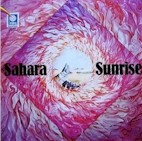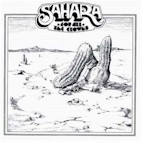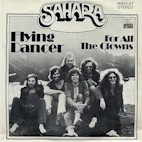
Genre: progressive
Rating: 3 stars ***
Title: Sunrise
Company: Peters International
Catalog: PILPS
9009
Year: 1974
Country/State: Munich, Germany
Grade (cover/record): VG / VG+
Comments: minor edge wear
Available: SOLD
Catalog ID: SOLD 6203
Price: SOLD $75.00
Originally know as Subject, by the late 1960s multi-instrumentalist Michael Hofmann, singer Alex Pittwohn, drummer Harry Rosenkind , keyboardist Peter Stadler, and bassist Stefan Wissnet were working under the name Subject Esq.
In tandem with another round of personnel changes and growing unhappiness with Epic Records, 1973 saw another name change - out the door went Subject Esq. with the revamped line-up seeing Hofmann. Pittwohn, and Wissnet joined by newcomers Hennes Hering on keyboards, drummer Harry Rosenkind, and lead guitarist Nick Woodland) operating as Sahara.
Signed by the Ariola's German Pan subsidiary (Dawn signed them in the UK and Peters International acquired American distribution rights), 1974's "Sunrise" teamed the band with producer Mack. Never having heard the 1972 Subject Esq. album ("Subject Esq"), I can't compare the two bands, but the general impression left by Sahara's debut was of a band that had been heavily influenced by British progressive bands and was looking to straddle the creative line between commercial acceptance and artistic acceptance. There wasn't anything particularly original or innovative in these grooves, but the performances were all energetic and entertaining. As lead singer Pittwohn had a nice voice that probably would have benefited from being mixed upfront a bit more; he was occasionally overshadowed by some of the arrangements. The rest of the band were quite good though the prime focus on keyboard player Hering.
- 'Marie Celeste' opened up with a snippet of what sounded like classical music coming off of an old radio before Woodland's guitar and some soul horn charts kicked in. Just as abruptly the song shifted gears with Hering's church organ turning the song into a progressive dirge and opening up the door for Pittwohn's measured vocals. After stumbling around for a minute or so the main melody finally emerged. Breezy and surprisingly commercial, the performance actually had kind of an AOR feel to it. rating: *** stars
- Penned by Pittwohn, 'Circles' was a surprisingly accomplished country-rock number. With an instantly likeable melody and some wonderful harmony vocals, I certainly wasn't expecting anything like this one, though progressive fans were probably less impressed. rating: *** stars
- The initial couple of minutes of 'Rainbow Rider' found the band returning to a conventional rock oriented sound (which reminded me a but of early Lake). To be honest, the early rock segments of the track were way better than the abrupt shift into keyboard propelled jazz and progressive interludes. I'll give the band credit for pulling out those surprisingly sweet harmony vocals at the end of the song. An edited version of the track was released as a German single. rating: *** stars
- Clocking in at over 27 minutes, side two showcased the two part, multi-segmented instrumental title track suite. I've listed to the track dozens of times and since the individual segments aren't clearly defined, figuring out where one segment started and ended has always been a challenge. These descriptions represent my best stab at it. Largely penned by Hofman, the song started out with some bizarre sound effects; bubbling water, babies, thunder before Woodland's guitar and Wissnet's bass kicked in giving the composition a breezy jazz-rock fusion flavor throughout 'Sunrise'. *** stars
- 'The Divinity of Being' opened up with some snaky Hofmann synthesizers giving the track kind of a middle eastern-meets-space-invaders flavor. Mildly entertaining, but simply didn't go anywhere. rating: ** stars
- Written by Wissnet, 'Perception including 'Devil's Tune'' picked up the tempo with a mechanical segment that almost sounded like a production line. ** stars
- Complete with Pittwohn woodwinds, 'Paramount Confluences' was a pretty slice of adult contemporary atmospherics. Nice rainy Sunday morning mood music (ironic since the track ends with the sound of a thunderstorm). rating: ** stars
- 'Aspiration' opened up with a blazing Woodland solo before slowing down into another keyboard (including a harpsichord segment) and synthesizer dominated mood piece. Pretty and calming, but not particularly memorable. rating: ** stars
- 'Creativity' picked up the tempo with a rollicking guitar-propelled segment. To my ears, this was easily side two's most focused and enjoyable segment. rating: *** stars
- Starting out with a mesmerizing guitar and bass groove, 'Realisation' (their spelling, not mine), was one of the few segments that could stand own it's own. while the basic groove remained constant, the overlying arrangement got increasing complex, to the point it started to sound like a piece of music scripted for a film soundtrack. rating: *** stars
As mentioned above, the album was tapped for a single in the form of:

- 1974's 'Rainbow Rider' b/w 'Circles' (Pan catalog number 13 331 AT)
To be honest, it isn't the masterpiece some fans would have you believe, but there are a couple of interesting numbers and it's probably worth buying if you can find it at the right price.
"Sunrise" track listing:
(side 1)
1.) Marie Celeste (Hennes Hering - Nick Woodland) - 7:35
2.) Circles (Alex Pittwohn) - 4:38
3.) Rainbow Rider (Michael Hofman - Nick Woodland) - 8:36
(side
2)
1.) Sunrise - 27:16
Part 1
a.) Sunrise (Michael Hofman)
b.) The Divinity of Being (Michael Hofman)
c.) Perception including 'Devil's Tune' (Stefan Wissnet)
d.) Paramount Confluences (Michael Hofman)
Part 2
a.) Aspiration (Michael Hofman)
b.) Creativity (Michael Hofman)
c.) Realisation (sic) (Michael Hofman)


